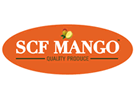 The current mango market is very unstable, both in terms of price and quality. "On the spot market, it is dangerous to do business," says Carlos André de Faria from the European sales office at Brazilian mango producer Sun City from Bleiswijk. "As for the programs with retail, the quality and the prices are a lot better."
The current mango market is very unstable, both in terms of price and quality. "On the spot market, it is dangerous to do business," says Carlos André de Faria from the European sales office at Brazilian mango producer Sun City from Bleiswijk. "As for the programs with retail, the quality and the prices are a lot better."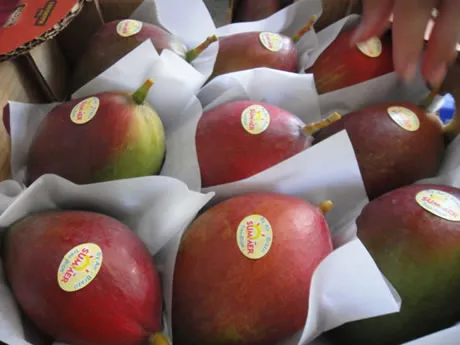
From January to March, the mango market will be dominated by Kent-Mangos from Peru. In April, Brazil will be the main supplier with Keith, Palmer and Tommy Atkins, then from the second week of May to July, the West African countries of Mali, Senegal and Ivory Coast will be active in the market, also the Central American countries Costa Rica, Guatemala and Mexico with Kent mangos. In August, Israel and Senegal provide several types. In September, the predominantly Spanish Osteen mangoes on the market, and from October to December Brazil is on the market with Keith, Kent, Palmer and Tommy Atkins.
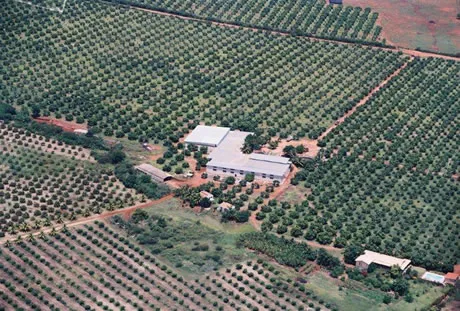
"But Brazil is the only country which can ship mangoes year round. If one of the other countries can not deliver their orders, Brazil is able to send more mangoes," says Andre. He sees little change in the varieties. "There are more and more Spanish-Osteen mangoes on the market. Osteen is a "sister" of the Palmer. Both were bred by the Florida State University in the 40s."
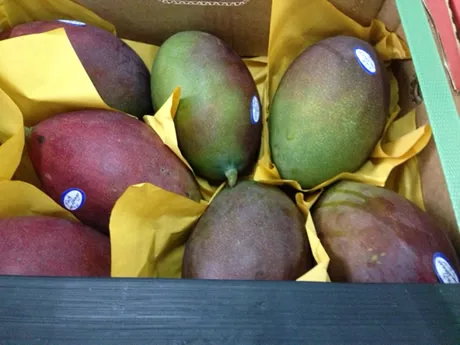
The current price of mangoes is between 6-7 Euro. Andre expects a stable price and volume in the market until the end of October. "After that it will mainly depend on the volume that Brazil is willing to send. The local market in Brazil is playing an increasingly important role in the decision to ship mangoes to other countries."
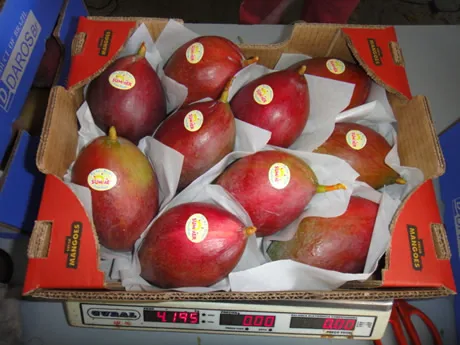
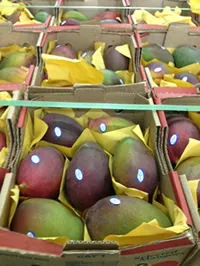 According to Andre, the demand for ready-to-eat mangoes is stable, but the prices are falling. "The fact is that fewer shippers are willing to accept the reduced prices for the necessary certifications and ripening facilities. If there was a combination of tree ripened fruit by air freight and artificially ripened mangoes, that would be better for the quality and colour of mangoes and growers would also be paid fairly for the certifications and losses after artificial ripening. In countries such as Portugal and Spain, you see that the consumer is getting better at classifying the quality of mangoes and growers are paid more for airfreight. This can also be a benefit for the Northern European consumers. If supermarkets explain the differences, I am sure that consumers are also willing to pay a higher price."
According to Andre, the demand for ready-to-eat mangoes is stable, but the prices are falling. "The fact is that fewer shippers are willing to accept the reduced prices for the necessary certifications and ripening facilities. If there was a combination of tree ripened fruit by air freight and artificially ripened mangoes, that would be better for the quality and colour of mangoes and growers would also be paid fairly for the certifications and losses after artificial ripening. In countries such as Portugal and Spain, you see that the consumer is getting better at classifying the quality of mangoes and growers are paid more for airfreight. This can also be a benefit for the Northern European consumers. If supermarkets explain the differences, I am sure that consumers are also willing to pay a higher price."For more information:
Carlos André de Faria
Sun City bv
Klappolder 191
2665 MP Bleiswijk
Tel: 0031 10-2667640
andre@suncity-fruit.nl
www.scf-mango.com
